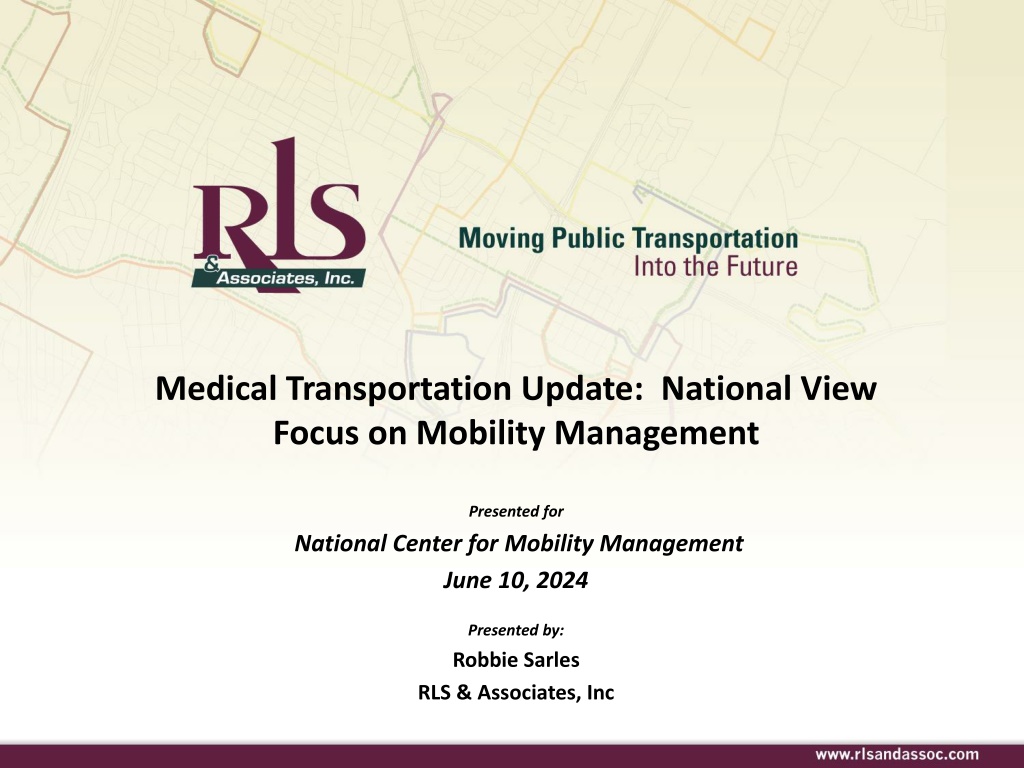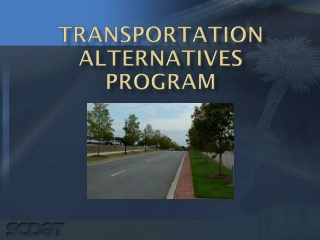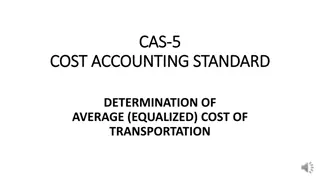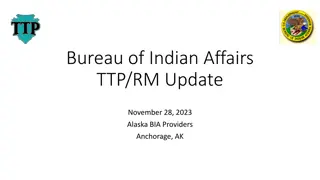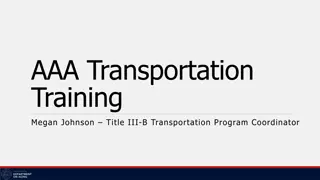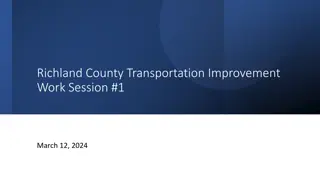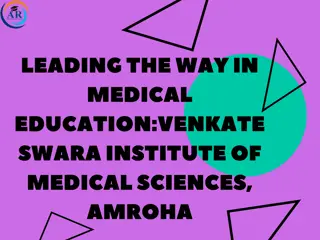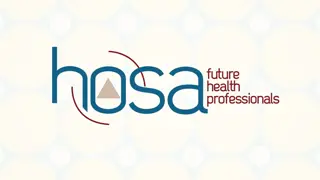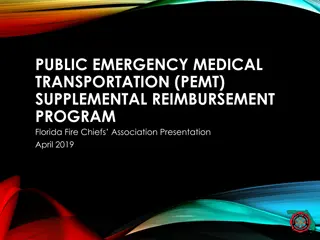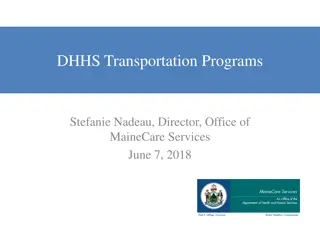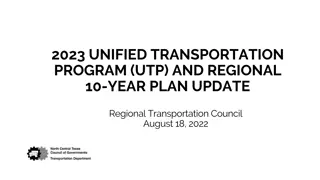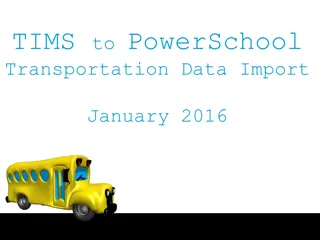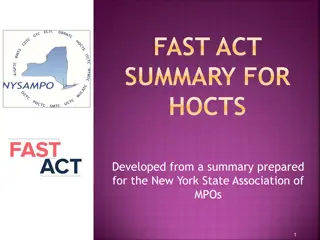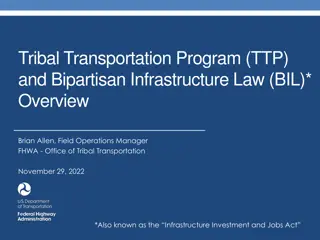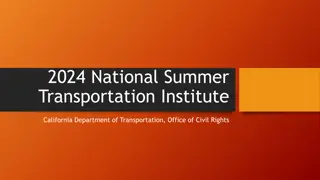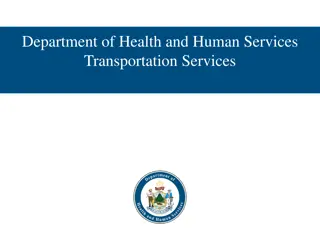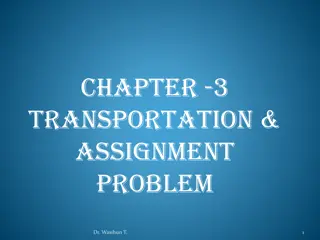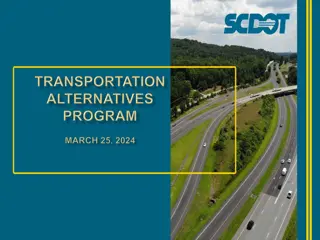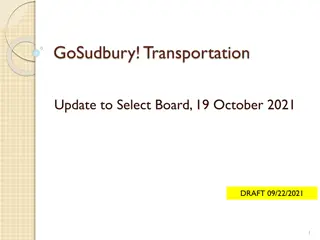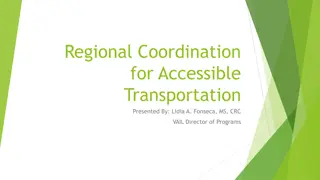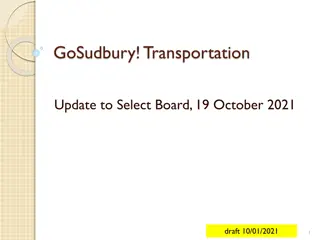Medical Transportation Update: National View
Providing insights into the latest developments in national mobility management, particularly regarding transportation updates for Medicaid beneficiaries. Covering statutory requirements, challenges, and stakeholder involvement in ensuring access to healthcare through effective transportation services.
Download Presentation

Please find below an Image/Link to download the presentation.
The content on the website is provided AS IS for your information and personal use only. It may not be sold, licensed, or shared on other websites without obtaining consent from the author.If you encounter any issues during the download, it is possible that the publisher has removed the file from their server.
You are allowed to download the files provided on this website for personal or commercial use, subject to the condition that they are used lawfully. All files are the property of their respective owners.
The content on the website is provided AS IS for your information and personal use only. It may not be sold, licensed, or shared on other websites without obtaining consent from the author.
E N D
Presentation Transcript
Medical Transportation Update: National View Focus on Mobility Management Presented for National Center for Mobility Management June 10, 2024 Presented by: Robbie Sarles RLS & Associates, Inc
Transportation Assurance Transportation is an essential feature of the Medicaid program Ensures beneficiaries access to health care Consolidated Appropriations Act (CAA) added statutory requirement State plan must include description of the method used to ensure necessary transportation 2
Transportation Assurance CAA Section 209 obligates CMS to: Convene a series of meeting to obtain feedback and facilitate discussion Assess and update CMS guidance issued to states for Non-emergency Medical transportation (NEMT) Submit report to Congress on NEMT based on analysis of nation-wide data set Expanded Report to Congress: NEMT in Medicaid 2018- 2021; published June 20, 2023 3
Challenges To Mobility Management Changing/Evolving Medicaid & NEMT Service Delivery Models Fee-for-Service at the Local Level Brokered Services at the Regional or Statewide Level Managed Care at the Statewide Level 4 of 16 4
Challenges in this Project Diversity in the Network of NEMT Service Providers Transit Agencies Nonprofit Organizations Private, For-Profit Transportation Companies Owner/Operators Differing State Medicaid Models 5 of 16 5
Challenges To Mobility Management Historical Obstacles to Coordination Same Words; Different Languages Early Misunderstanding of the Existing Transportation Network Philosophical Misalignment Mistrust; Fraud Concerns Insufficient/non-vetted Cost Allocation Methodologies 6 of 16 6
State Medicaid Director Letter Announcement Published September 28, 2023 Provides an overview of requirement, policy, and guidance for the assurance of transportation in Medicaid as a mandatory service Calls on states to fully operationalize, monitor and improve the way they meet the transportation assurance 7
Medicaid Transportation Coverage Guidance Authored by Centers for Medicare and Medicaid Services (CMS) Herculean effort Reflects Coordinating Council on Access and Mobility (CCAM) dialog 8
Medicaid Transportation Coverage Guidance Compilation of Medicaid transportation policy on federal requirements and state flexibilities Clarified existing Explained new Encouraged best practices Encourages states, MCO and transportation providers to work collaboratively to ensure beneficiaries are educated and informed 9
Transportation Access Requirements Necessary Transportation No other option is available Nearest Qualified Provider Unless Medical Need Least Costly/Most Appropriate Physical/emotional condition of the beneficiary Must consider quality of service Improve Passenger/Provider Relations 10
Public Transportation Partnerships State Medicaid agencies are encouraged to explore partnerships with State DOT agencies to better serve the Medicaid population 11
Public Transportation Coordination Allows for trip sharing Medicaid is payer of last resort Medicaid only pays for its portion of a coordinated trip States have flexibility to utilize cost allocation methods reflecting basic cost principles Implied reference to CCAM cost principles and SBIR cost allocation model 12
Provider Payments Must not offer payment too low that results in a limited number of potential service providers States have flexibility to explore a broad array of innovative payment models 13
Provider Payments Travel related costs covered as a direct expense Overnight long distance trips Lodging, Meals Transportation Attendant States afforded flexibilities for coverage of wait times and long distance trips 14
Recognizes Fundbraiding Cannot use fundbraiding to match Medicaid Can use fundbraiding to match transit programs to increase coordination among Federal agencies that provide transportation services Section 5311 Section 5310 Section 5307 15
Opportunities MM Should Be Part of the Dialog Know the Model, Philosophy and Players within your State and Local Communities Define What You Bring to the Table How You Can Meet Their Needs Community Based Liaison Establish Viable/Sustainable Partnerships 16
Contact Information Robbie Sarles RLS & Associates, Inc. rsarles@rlsandassoc.com
